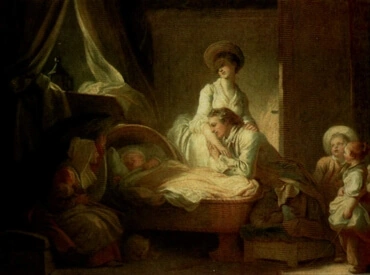In a general sense, being "born" in the Bible represents one spiritual state producing another, usually some form of love or affection producing or "giving birth" to truth or to desires for good. This is not hard to see: If you love someone, that love naturally gives birth to ideas on how to be good to that person and make him or her happy. This is why sons and daughters in the Bible represent true ideas and desires for good. On a higher level, though, being born represents what the Writings call "regeneration," or the life-long process of putting off our natural thoughts and desires and embracing spiritual life from the Lord. This is what the Bible means when it talks about being "born again" – if we live our lives from the Lord, He will eventually take away our evil desires so that we can be "born" as angels in heaven, free of evil desires and dark thoughts. Of course, these two levels of meaning are really one: The Lord is love itself, and if we align with Him we become forms of love and truth ourselves, expressions of His love just as the desire to do something good might be the expression of your love for a friend.
Arcana Coelestia #5161
5161. 'That he made a feast for all his servants' means the introduction and joining to the exterior natural. This is clear from the meaning of 'a feast' as the introduction to a joining together, dealt with in 3832, and also as a joining together through love and a making one's own, 3596; and from the meaning of 'servants' as the things which belong to the exterior natural. For when a person is being regenerated lower things are made subordinate and subject to higher ones, that is, exterior things are made so to interior ones. When this happens the exterior things become servants, and the interior become masters. This is the meaning 'servants' has in the Word, see 2541, 3019, 3020. But the kinds of people who become 'servants' are those who are loved by the Lord, for it is mutual love which joins them together and leads them to see their service to Him not as bondage but as whole-hearted allegiance, since good enters from within to produce that kind of delight there. In former times feasts were held for various reasons; and they meant an introduction into mutual love and so meant a joining together. Feasts were also held on birthdays; these represented the new birth or regeneration, which is a joining, through love, of a person's interiors to his exteriors, consequently a joining together in him of heaven and the world. For what is worldly or natural in a person is joined to what is spiritual and celestial.







